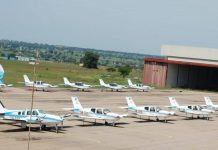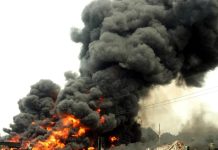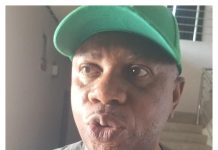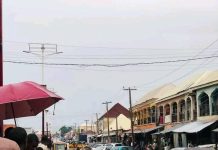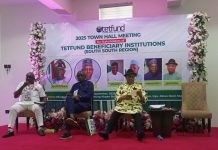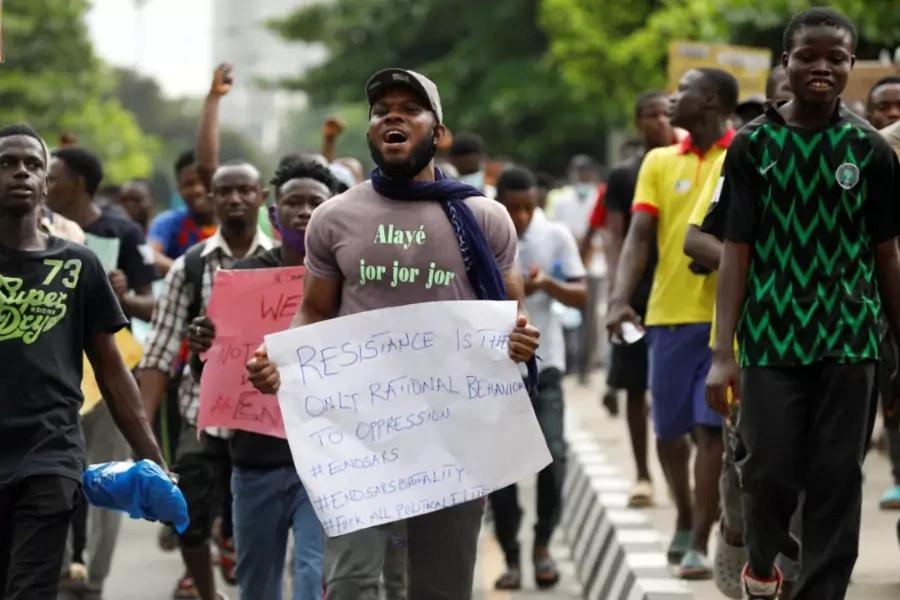
Abba Hamisu Sani
Africa-Press – Nigeria. Nigeria conducted Presidential and National Assembly elections on Saturday 25th February 2023 across the 36 states of the Federation and the Federal Capital Territory Abuja.
The election which Nigerians are waiting for its outcome any moment from now from the electoral body; Independent National Electoral Commission INEC will mark the end of President Muhammad Buhari’s tenure as the fourth Democratically elected President since the return of Democracy in 1999.
Eighteen Candidates under various Political parties contested the number one position .But four are the most prominent among them ; Bola Tinubu of the ruling All Progressives Congress , Former Vice President Atiku Abubakar of People’s Democratic Party, Peter Obi of Labour Party and the former Governor of Kano state Dr. Rabi’u Musa Kwankwaso of the New Nigeria People’s Party.
By all indications the election experienced low turnout in some parts of the country and this could not be unconnected with the harsh economic condition faced by the majority of the citizens due to the currency shortage in the country.
Who may likely win the election among the contenders?
The most likely Candidate to win this election can not be predicted at this moment as the outcome of the poll is coming in piecemeal but APC and PDP are leading by all indications .
It is important at this point to wait for the INEC to conduct its constitutional duty of announcing the election result hence the emergence of the new President.
Economic and security challenges ahead of the next President
Nigeria is the largest economy in Africa with a Growth Domestic product of 1.082 trillion Dollars at the end of 2022 .
The economy which is heavenly really on crude oil, high consumption coupled with low production capacity needs a turn around policy and programmes.
Whoever wins the Presidential election in Nigeria will inherit a weak economy which will need more creativity and determination.
Some of such challenges are high rate of poverty ,unemployment ,power shortage .Despite Nigeria being the largest economy in Africa but is among the ten countries of the world with highest poverty rate .
Nigeria spends billions of dollars on power generation but yet to have the good energy that will ginger industrialization which will create more employment.
The outgoing Buhari’s administration was expected to tackle the power shortage issue but it fell short of the expectation.
Agriculture is another strategic sector that improves the economy through providing direct and indirect jobs. The outgoing administration invested huge amounts in this sector with the intention of providing food security but lack of proper implementation and corruption crippled the policy.
Insecurity is another multidimensional challenge for who will be the next leader of Nigeria as the problem persists for years .The issues range from Indigenous people of Biafra IPOB uprising , Kidnapping for ransom ,Boko Haram ,and Farmer harder clashes .
A lot of resources were committed in solving such lingering problems but yet to be settled .
Another security and economic threat that need immediate action is demonstrations and vandalization of Banks due to currency shortage as a result of the currency swap by the Central Bank of Nigeria
Chukuma Okoli is a Political Scientist and analyst . He said the next President should be ready for so many challenges as the country needs a path finder .
He stated this in his recent Article published by Punch News Paper titled “Five major challenges facing Nigeria’s next president”
It’s worth considering the key challenges the country’s next president will deal with as he takes on his mandate.
The challenges revolve around five critical areas: national cohesion security , economy, the university system and fight against corruption.
The political scientist expressed optimism that the challenges are surmountable if the next president has the will and commitment to the ideal of democratic governance.
Fractured polity: Nigeria is more divided and polarized than it’s ever been. The cleavages and fault-lines of ethnocentrism, sectarianism, sectionalism, parochialism and religious extremism are pushing the country to the brink.
The analyst said the polarization is evident in conversations around the de facto rotational presidency, the controversy over presidential candidates and religious faith, the neo-Biafra separatist agitations in the south east, and the toxic and bigoted ethnocentric rhetoric peddled in the mainstream and social media.
The next president must undertake urgent measures at national reconciliation and integration to avert impending chaos.
Collapsing national security: The prevailing state of national security in Nigeria is apocalyptic. The receding Boko Haram insurgency in the north east is being substituted by a nexus of banditry and terrorism in the north-west.
The north central is still grappling with the deadly farmer herder crisis. For its part the south-east is enmeshed in separatist violence and the associated criminal opportunism.
There is an upswing in gang and ritual brigandage in the south west while south south is still afflicted with militancy, piracy and oil theft.
The next president must get a grip on these dire security threats
Battered economy: Nigeria is battling with slow economic growth. The national currency (naira) has been grossly devalued amid a volatile exchange rate. Inflation and unemployment rates are high and rising.
Rises in the cost of living are unprecedented and unbearable. The government seems to have lost traction on national economic planning and management. The next president has the challenge of revamping an ailing and critically dysfunctional economy.
Restive university sector: Nigeria’s university system is witnessing a systematic deterioration as a result of government neglect.
In 2022 public universities in the country lost nearly a year due to an industrial dispute between the federal government and the various university unions over issues relating to funding, governance and workers’ welfare. The crux of the dispute was the government’s failure to honor a series of agreements it signed with the unions.
In an effort to break the continuing strike of the academic staff union in late 2022, the federal government secured a court order compelling the lecturers to go back to work. But the conditions and issues that warranted the strike have barely been addressed.
This means industrial harmony and stability won’t last in the country’s university sector. The next president may wish to take early note of this.
Endemic public corruption: Corruption among public functionaries in Nigeria is endemic, though the current administration claims to be opposed to it.
Even the former accountant general of the federation was alleged to have swindled over 100 billion naira (US 216,449 million US dollar).
The next president must confront the menace by setting an example of transparency and zero tolerance of self regard.
What needs to be done by the incoming President
It’s clear that the next president is inheriting a massive governance burden. Dealing with it requires forthrightness, sincerity of purpose and radical political will.
To succeed he needs to be ready to approach governance differently. He must be decisive enough to confront an entrenched system of vested interest and self-regard.
He must be a patriotic statesman who is committed to the utilitarian principle of democratic governance, the greatest happiness for the greatest number of the civil populace.
“The fate of the country in the face of these challenges largely depends on the strength of character and dedication of the incoming president.
A good statesman will be able to mitigate the problems by adopting a hard-line commitment to the principles of democratic good governance, even in the face of possible reactionary pressures arising from entrenched vested interests. But, under a bad statesman, the chances are that the challenges will aggravate into a combustible mix that may herald a failed state in Nigeria.” The Political Scientist stated.
For More News And Analysis About Nigeria Follow Africa-Press


